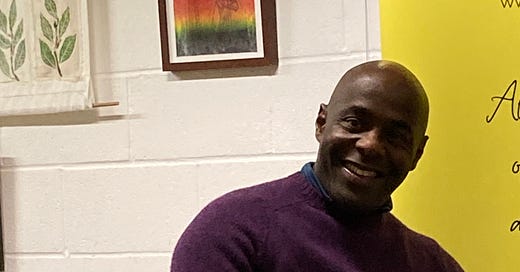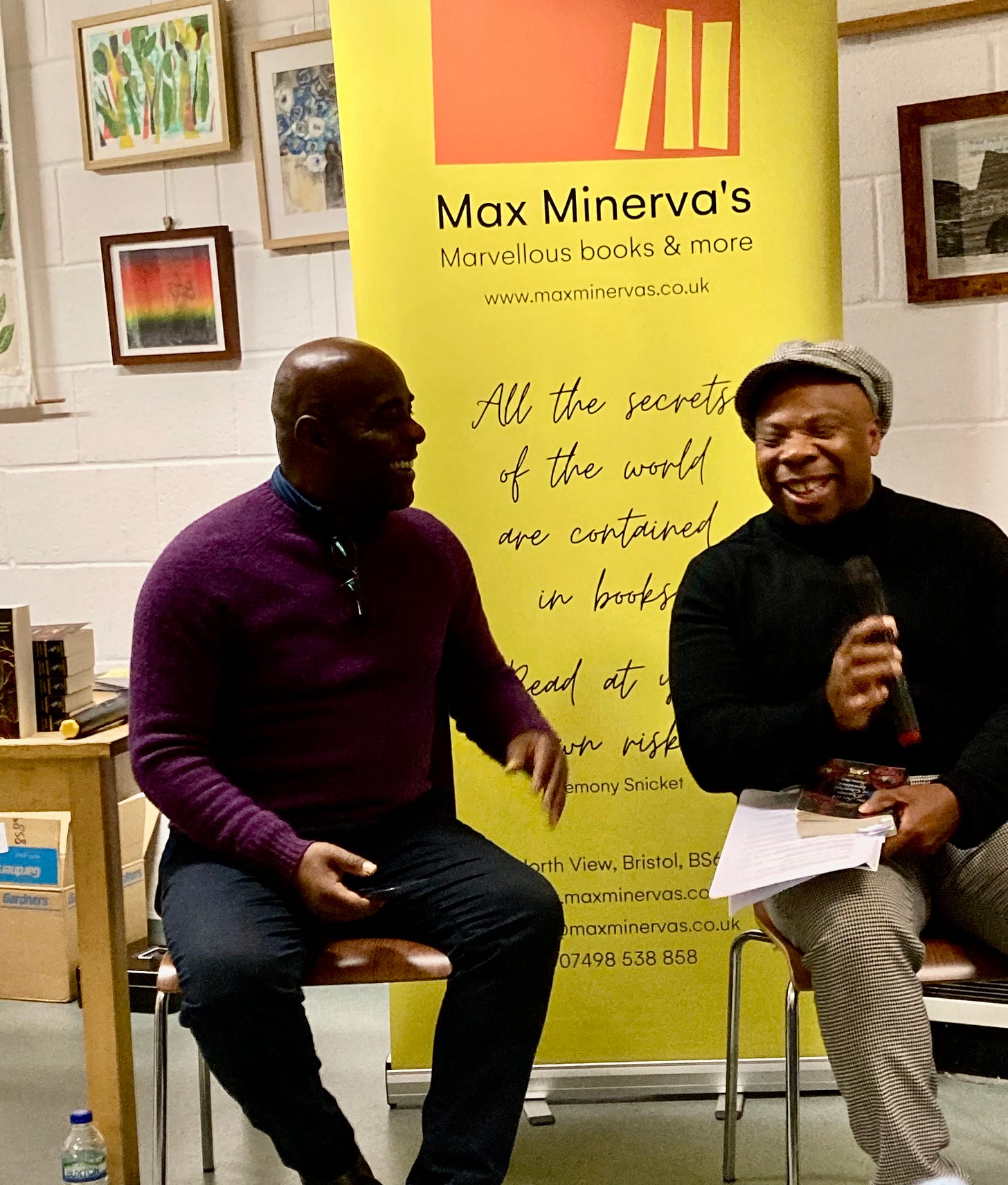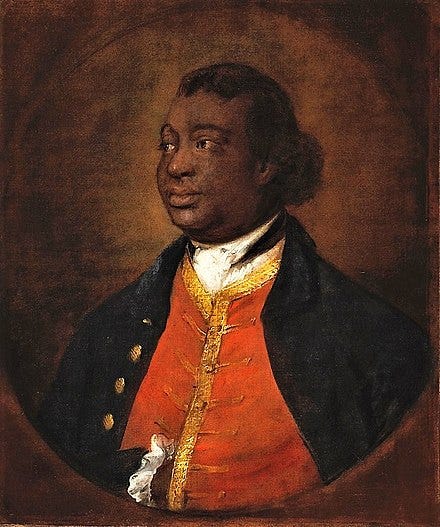Hi there! This is my third Behind the Scenes post about my writing life. If you missed the other ones, you can catch up with them here:
The Divide - about the book launch for my short psychological thriller set in Bristol, about race and privilege.
The Power of Retreats - on the three kinds of retreat we so desperately need.
You might also be interested in the first extract from my nature memoir, Wilderness.
Sanjida x
Meeting Paterson Joseph at Max Minerva’s book event in St Pauls, Bristol was hands down the best book event I’ve been to (other than my own book launches, obviously!). It was entertaining, informative, inspirational, I got to have a quick private chat with Mr Joseph before the start of the show and tried not to gush at him (he was lovely); perhaps, above all, it was the first book event I’ve been to where I was not the only non-white person in the room.
"No one should be denied their freedom to belong where they were raised." Paterson Joseph
For those who haven’t heard of Paterson, he’s an actor whose starred in Othello at The Royal Exchange, Manchester, and been in Peep Show, Casualty, The Beach, and more recently, played Kamal Hadley in Noughts and Crosses, Samuel in Boat Story and Slugworth in Wonka. His debut novel, The Secret Diaries of Charles Ignatius Sancho, was published by Dialogue Books and has won the RSL Christopher Bland Prize and was shortlisted for the Jhalak Prize in 2023. The Secret Diaries is about a real man, Charles Ignatius Sancho, who was born a slave in 1729 but was raised as a servant in London, and by all accounts, was extraordinary. At a time when it was illegal to teach a slave to read, Sancho became educated, wrote and published plays, composed and published music, met the King, was a butler and a valet to a Duke and was the first Black British person to vote (my review of his book is coming soon - here and on WritersMosaic).
Paterson first heard about Sancho when he saw a stunning portrait of him, painted by Thomas Gainsborough. Like many of us, he thought there were few black people in Britain until after the Windrush generation, in the late 1940s - instead of, as we now know, some 30,000 in London alone. Paterson had been trawling through the archives looking for a character he could play. “It sometimes feels that I was born in the wrong time. For casting purposes, it seems I was born in the wrong skin. So, I thought I’d better find a route in for myself,’ he wrote in The Guardian. “I’m frequently asked how I came to write about Sancho; the answer, sadly, confirms the well-known, self-absorbed nature of the actor’s art. I wanted to be in a costume drama. Yes, I like them. I enjoy the leap of imagination and the richer-than-modern-language they often contain. I wanted to wear a ruff, or an ornate waistcoat, even a foppish, stylish wig. But not as a tray-toting, background figure. I wanted to be a protagonist.”
“I wanted to be in a costume drama. I wanted to wear a ruff, or an ornate waistcoat, even a foppish, stylish wig. But not as a tray-toting, background figure. I wanted to be a protagonist.” Paterson Joseph
The result was Sancho: An Act of Remembrance, a play Paterson wrote and starred in. So far, he’s spent 25 years researching Sancho’s life and during lockdown, turned Sancho’s story into a novel. At the book event, Paterson read a couple of extracts from his novel, and perhaps because he’s spent so long researching and performing and then writing about Charles Ignatius Sancho, he seemed to inhabit him with ease. It became less a reading and more a performance, as the book was set aside, and Paterson transformed into a rather theatrical, grandiose, humorous, and, as he kept telling us, rotund eighteen century gentleman.
Paterson - in spite of his credentials as an actor, as someone who has written and performed a stellar one-man-show, his evident fame, his years of research and his gift as a writer - was not able to find a publisher for The Secret Diaries. Every British publisher rejected him on the basis that they didn’t believe there was so many black British people at the time or that an ex-slave could have been so articulate or so well educated, and perhaps, because they were looking for, as Paterson puts it, “slavery porn”. About to give up, he turned to
, who suggested trying Sharmaine Lovegrove at Dialogue Books, who, as Paterson says, “immediately got it”. The vindication is, of course, sold out book events, rave reviews, book prizes and the offer of further book deals.As someone who has encountered a fair share of racism throughout my career in TV, journalism and publishing, I found this inspirational. When I met Paterson I was feeling pretty dejected. I’d spend over a year working on a synopsis for a non-fiction book. For those of you who haven’t had to submit a non-fiction book proposal in order to get a publishing deal, I can tell you now, it is a lot of work. Publishers require a one page selling document, a synopsis that explains what the book will be about, what the market is, what other books your book will be like, your biography, plus a chapter break-down - which means you need to have spent considerable time researching the whole subject to know what will be in the book and what chapters you’ll have and what will go in those chapters, PLUS one or two chapters. Which amounts to approximately 10,000 words and a great deal of time. All of which is unpaid and speculative. (I am inordinately grateful to the Society of Authors who gave me a grant to help me through this stage). My agent at C&W thought it was brilliant and showed the book to over twenty publishers. All of whom liked the idea but didn’t commission it. The story? My journey to rewild a forgotten fragment of Somerset, and the story of my search for belonging as a mixed-heritage child who grew up in rural Britain. Which, as most of you know, is almost exclusively white. The little feedback I had was - we love the nature, but not the part about race.
Dispirited I was on the brink of giving up, then two things happened - I met Paterson and he told me his story, and I was asked by the
to help create their Substack, which I’m now managing. So I thought - why not start writing Wilderness and post it on Substack? If you’re here with me, I hope you guessed this twist was coming and do let me know what you think about Wilderness thus far!Paterson wrote in my copy of The Secret Diaries, “For Sanjida, ‘These stories are our stories’, Paterson Joseph.” In the Author’s Note at the start of the book, he has written, “No one should be denied their freedom to belong where they were raised.” This is going to be the frontispiece to my book, Wilderness: In Search of Belonging.
Do tell me if you have had any difficulties getting your books published. What stumbling blocks have you encountered?







